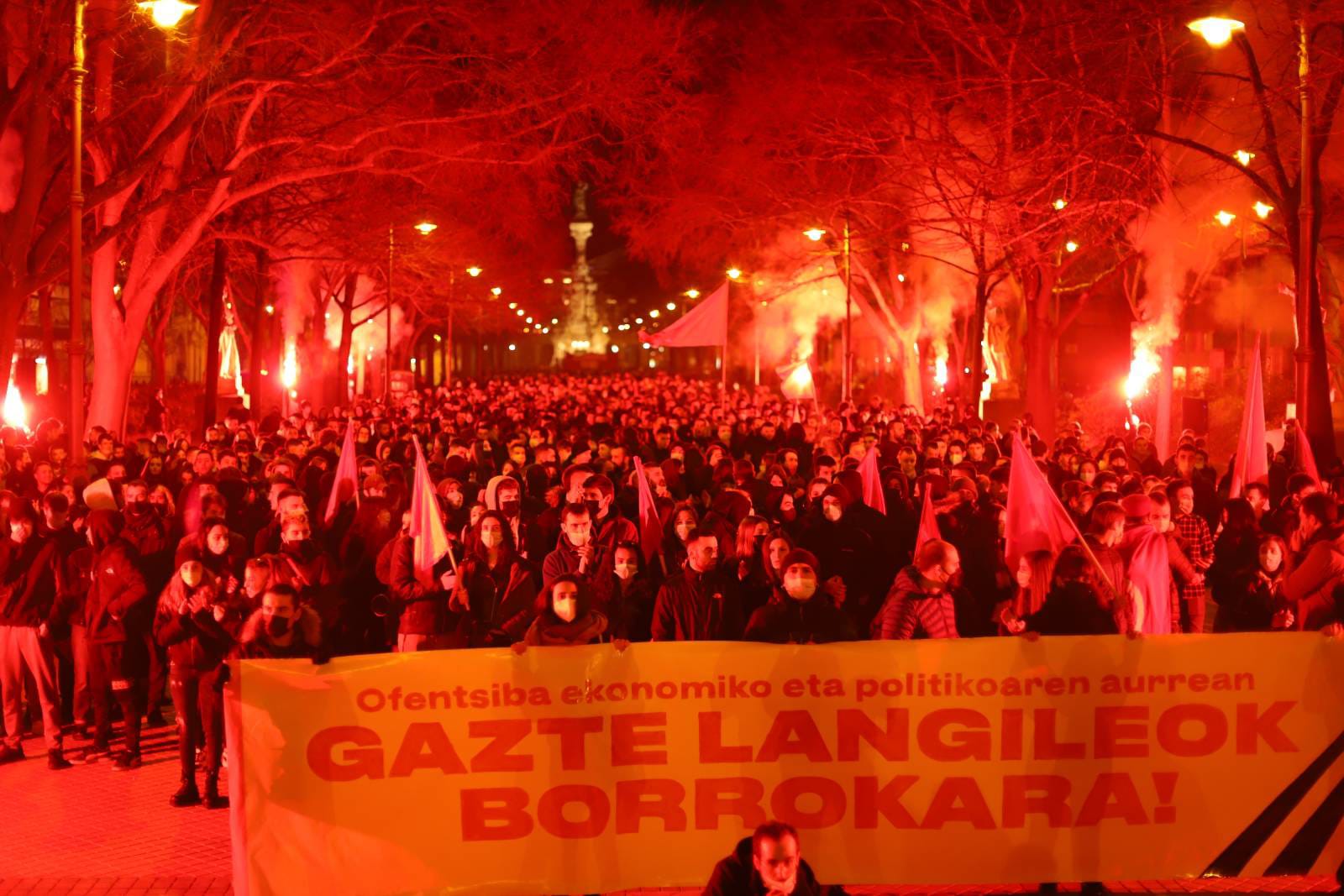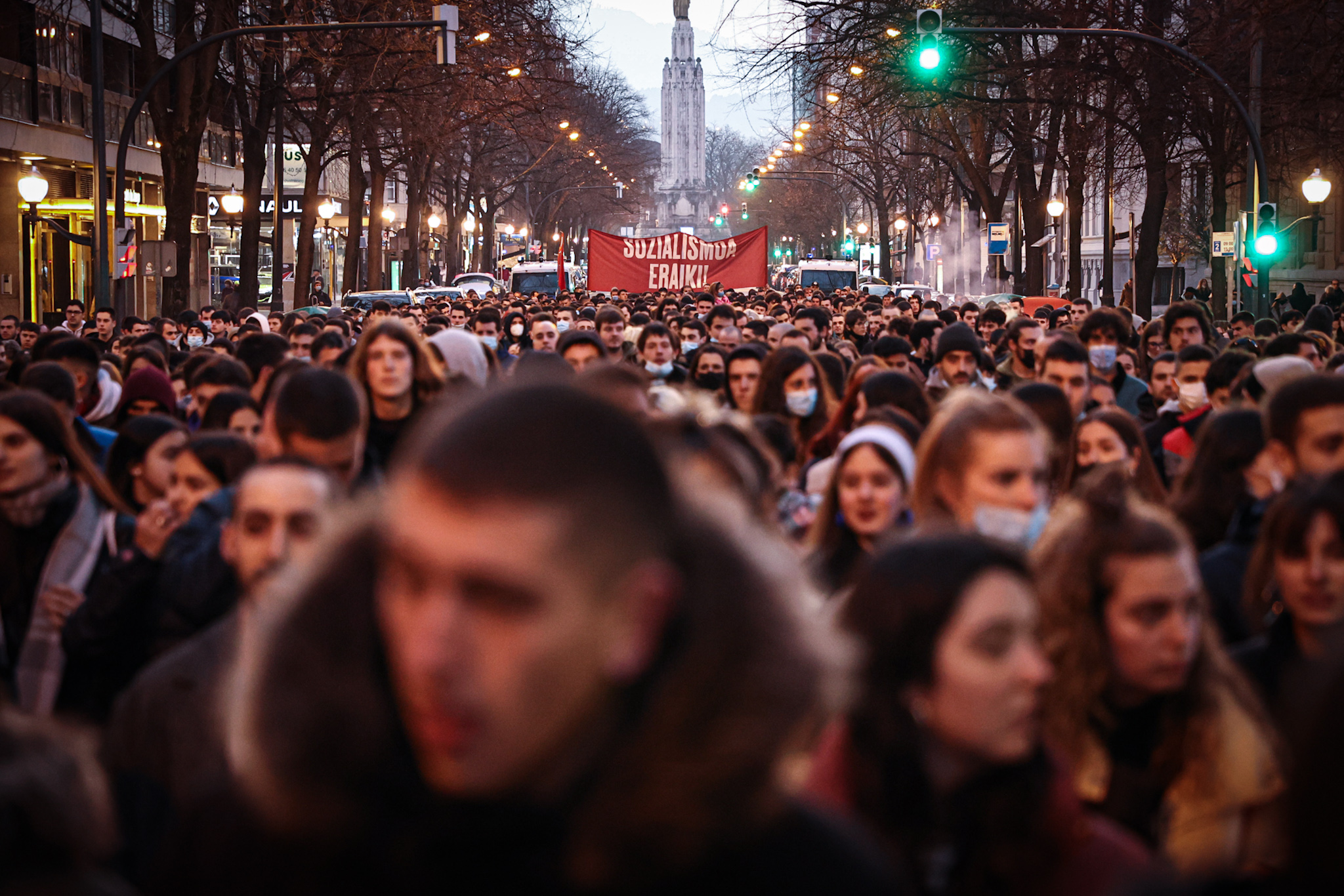The comrades of the International Marxist Tendency are following with enormous interest and sympathy the Socialist Movement in the Basque Country, which promotes the emergence of a mass communist movement, and defends the international character of socialism. We publish here a brief article on the characteristics of this extraordinary occurrence, and its current development.
Despite the apparent lack of protests due to the pandemic, a process of radicalisation has been underway in the Spanish State. In the Basque Country, mobilisations proceed with force, or have regained force especially this last year. On 29 January, massive demonstrations were held “against the dictatorship of the bourgeoisie", convened by Gazte Koordinadora Sozialista (GKS, Young Socialist Organisation), which brought together more than 7,000 young communists in Bilbao and Pamplona.
The Mugimendu Sozialista (Socialist Movement, MS) in the Basque Country groups together several organisations that position themselves against the “current democratic movement” (meaning the official wing of the Basque left), which prioritises the well-being and improvement of the conditions of the upper-middle-class. In fact, one of these radical organisations, GKS, emerged at a moment when the Basque left began to consolidate itself as an institutional party, with influence in Spanish state politics. At this key juncture, and together with the impoverishment caused by the capitalist crisis, class consciousness and interest in socialism have been revived. It is precisely in this context that we have seen the rise of this politically independent working-class movement, which has an internationalist perspective, and a clear and common goal: the building of a socialist state.
This process of transformation is ultimately due to the capitalist crisis, accelerated by the pandemic in these past few years. Initially, the pandemic saw the restriction of the labour movement through punitive and social control measures. But in parallel to this, an underlying process was underway that has been radicalising the population. This is on the brink of expressing itself through social eruptions. Some symptoms of this are the 29 January protest by GKS, and this year's 8 March Women's Day protest. With the emergence of groups such as GKS, UIB, ITAIA and the “Kontseilu Sozialistak” (Socialist Councils), we have seen a process of mobilisation and agitation in different areas and sectors of Basque society, including amongst the youth, on university campuses, among women, in the workplaces, etc.
 Despite the apparent lack of protests due to the pandemic, a process of radicalisation has been underway in the Spanish State. In the Basque Country, mobilisations have regained force especially this last year / Image: GKS
Despite the apparent lack of protests due to the pandemic, a process of radicalisation has been underway in the Spanish State. In the Basque Country, mobilisations have regained force especially this last year / Image: GKS
This is a response to the need to organise as a class and to confront increasingly serious attacks by the ruling class on the proletariat, as well as violations of basic rights. Over the past 12 months, we have seen great examples of the gathering fightback, with militants winning a physical office for student organisation at the Faculty of Psychology in San Sebastián last year, and at the Faculty of Education in Vitoria just a month ago. This demonstrates the importance of organising as a class, and the potential for real victories on this basis.
Another remarkable fact is the creation of platforms such as Itaia and Kontseilu, which spread in each region and unify respectively the struggle of working women, and workers as a whole. These platforms highlight, on the one hand, the orientation of the struggle for the emancipation of women along working-class lines, which represents a break with the prevailing trend of bourgeois feminism. On the other hand, they underline the increasingly militant class struggle methods in the labour movement. In the demonstration of last 3 March (the anniversary of the 1976 massacre of striking workers in Vitoria by the Franco regime), the Kontseilu of Vitoria organised together with GKS to form a socialist bloc, assembling large number of militants and sympathisers.
However, the most visible and massive mobilisation of the MS was 29 January, both in Bilbao and in Pamplona, under very bold slogans: “Against the dictatorship of the bourgeoisie", and denouncing “the economic and political offensive of the bourgeoisie”. These slogans attracted more than 7,000 people, mostly young, who are suffering the consequences of the system.
They rightly describe the worsening of living conditions for the workers, which has exacerbated the unequal distribution of wealth to the benefit of the bourgeoisie. Additionally, they are reacting to the suppression of fundamental rights and political freedoms, hand in hand with an increase in social control through restrictions, police repression and the criminalisation of the youth. Moreover, no political party, including those on the left, has been able to respond to the needs of the population. Indeed, GKS calls these left parties out for having been accomplices in or promoters of measures that they have later hypocritically denounced.
Therefore, it is clear that the present struggle is not aimed at merely improving the system, but that GKS and the MS are fighting to overcome the capitalist system itself, which has proved incapable of resolving the burning issues affecting workers and youth. Indeed, it is the source of these issues. In this regard, GKS stresses the need to organise independently of bourgeois institutional politics and to direct the struggle of the working class towards the construction of the socialist state. The MS actively seeks and applies a socialist perspective to its agitation and activity.
The International Marxist Tendency shares this perspective. It is essential that the working class is organised with the aim of overthrowing the capitalist system that increasingly shows its inability to improve our living conditions. The alternative to the present system must be socialism, which puts the needs of the working class above capitalist profits. We must assemble on the principle of working-class unity to fight for the building of a socialist system. We must extend this struggle to other territories, taking as an example the effectiveness of the MS’s struggle in the Basque Country. Let us confront the dictatorship of the bourgeoisie and fight for socialism!

